
Poker is a card game in which players place bets and raise or fold according to the strength of their hand. The best poker players have a number of skills including being able to calculate pot odds and percentages quickly, knowing how to read other players, and adapting to the situation. They also have the patience to wait for optimal hands and good position at the table. In addition, they understand how to bluff effectively and are able to take advantage of other players’ weaknesses.
The first step to becoming a successful poker player is learning the basics of the game. This includes understanding the rules of the game, etiquette, types of players, and strategies. It is also important to practice your game, and watch experienced players to learn how they react to different situations. This will help you develop your own instincts, which is a vital skill for success in poker.
One of the most important things to remember when playing poker is that your hand is only as good as the opponent’s. This means that even if you have a great hand, such as two kings, it is not worth raising if the other player has A-A. It’s important to keep this in mind as you play poker, and be sure not to overplay your hands.
Another crucial aspect of the game is analyzing your opponents and their body language. This can be done in person by observing physical tells, but it is also possible to do online. The goal is to learn your opponent’s habits and tendencies so that you can exploit them. This may include noticing that they always raise their bets when they have a strong hand, or that they tend to call early and then fold later on.
Once you have a firm grasp of the basics, it’s time to start building your bankroll. Ideally, you want to start at the lowest stakes so that you can play against the weakest players and gain experience without risking too much money. This will allow you to develop your strategy and improve your win rate before moving up the stakes.
When you’re ready to move up to the higher stakes, make sure to practice your game. This will help you get accustomed to the faster pace and build your skill level. It’s also a good idea to try out different poker variants, as each has its own rules and strategy.
Aside from learning the basics of the game, you should also practice your bluffing. This is an essential part of poker, as it can force weaker hands to call your bets and can give you some extra value on the flop. However, be careful not to bluff too often, as it’s easy to lose a lot of money by making bad calls. Also, be sure to check the shuffle and count the cards before betting. This will ensure that you’re not bluffing with a fake.
